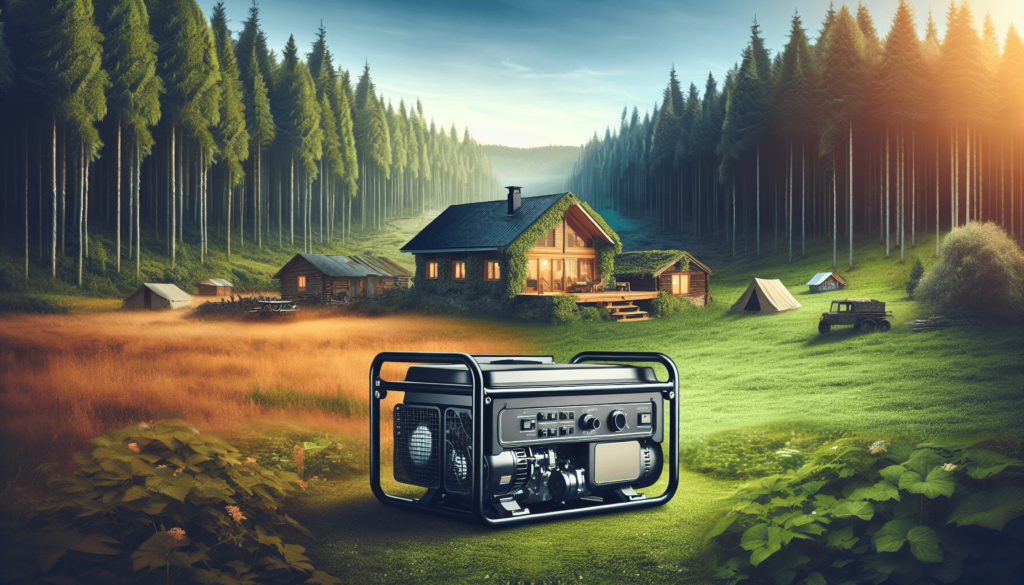
Ever wondered if living off-grid with a generator is a feasible option? If you’re considering taking a leap into sustainable living or just want to reduce your dependency on traditional energy sources, this thought has probably crossed your mind. The idea of living off-grid can be both exhilarating and intimidating. With a generator, you might find the balance between convenience and independence that you’re looking for. Let’s unpack everything you need to know about living off-grid with a generator.

Understanding Off-Grid Living
Transitioning to an off-grid lifestyle means you’re disconnecting from the public utility grid. This can encompass electricity, water, sewage, and other services. It’s all about self-sufficiency and sustainability—but more importantly, it’s about finding a way to live that aligns with your personal values.
What Does Off-Grid Really Mean?
Off-grid living usually implies being self-sustainable in terms of energy production. While this can extend to other areas like water, food, and waste management, sticking to energy will keep things simple for now.
Why Consider Off-Grid Living?
People choose off-grid living for various reasons, including environmental concerns, cost savings, and the desire for independence. Here’s a breakdown:
| Reason | Benefits |
|---|---|
| Environmental Impact | Reduced carbon footprint |
| Cost Savings | Lower long-term utility expenses |
| Independence | Freedom from utility service issues |
By understanding your motivations, you can better plan for the lifestyle you’ll be adopting.
The Role of Generators in Off-Grid Living
Generators can be your lifeline when living off-grid. They provide electricity to power essential appliances and maintain a certain quality of life.
Types of Generators
There are a few different types of generators to consider. Each has its own set of pros and cons, depending on your unique needs.
| Type | Fuel | Advantages | Disadvantages |
|---|---|---|---|
| Diesel | Diesel | Efficient, long-lasting | Noisy, not eco-friendly |
| Gasoline | Petrol | Easily accessible fuel | Shorter lifespan, higher fuel cost |
| Propane | Propane | Cleaner burning, longer shelf-life | Requires storage space |
| Solar | Solar batteries | Renewable, quiet, eco-friendly | Dependent on weather, expensive initial setup |
How Much Power Do You Need?
Understanding your power needs is crucial. Calculate the wattage of the devices you plan to run off your generator. Make a list of your essential appliances and their power requirements to assess your needs accurately.
| Appliance | Wattage |
|---|---|
| Refrigerator | 600 watts |
| Lights (10 bulbs) | 600 watts |
| Laptop | 100 watts |
| Water Pump | 800 watts |
| Total | 2100 watts |
How to Choose the Right Generator
Once you have a clear understanding of your power needs, you can choose a generator that suits them. Look for reliability, ease of use, fuel efficiency, and the type of fuel it uses. Don’t forget to consider the environmental impact and sustainability of the fuel type.
Installation and Maintenance
Proper installation and ongoing maintenance of your generator are critical to ensuring it remains functional and efficient.
Initial Setup
Before you start, you’ll need to find a suitable location for your generator. It should be in a well-ventilated area to prevent carbon monoxide buildup.
Connecting to Your Power System
You’ll likely need a transfer switch to connect your generator to your home’s electrical system safely. It’s advised to have a professional electrician install this to comply with local regulations and ensure safety.
Regular Maintenance
Maintenance tasks can range from changing the oil and air filter to inspecting the fuel lines and electrical connections. Regular checks can prolong the life of your generator and ensure it operates efficiently.
| Task | Frequency |
|---|---|
| Oil Change | Every 100 hours or annually |
| Air Filter Replacement | Every 200 hours or annually |
| Fuel Filter Replacement | Annually |
| Battery Check | Monthly |
| General Inspection | Monthly |
Fuel Storage and Safety
Storing fuel safely is another critical aspect of living off-grid with a generator. Incorrect storage can lead to accidents, fuel shortages, and inefficiencies.
How to Store Fuel
Opt for approved fuel containers and store them in a cool, dry place. Ensure they are sealed tightly and labeled accurately.
Safety Considerations
Always keep fuel away from living areas and in a well-ventilated storage area. It’s also wise to have fire-safety equipment nearby.
Alternative Fuel Options
You might also consider alternative fuel types, like biodiesel or alcohol-based fuels, which can be more sustainable and eco-friendly.

Solar Generators as an Alternative
While traditional fuel generators are effective, solar generators offer an eco-friendly alternative. They harness the sun’s energy and convert it into electricity.
Benefits of Solar Generators
Solar generators are silent, renewable, and have minimal ongoing costs once installed. They are perfect for sunny climates and offer an endless supply of clean energy.
Challenges of Solar Generators
However, they are weather-dependent, and their initial cost can be relatively high. You’ll also need enough storage batteries to ensure power availability during cloudy days or nighttime.
Hybrid Systems for Enhanced Reliability
Combining different energy sources can give you the reliability and flexibility you need for off-grid living.
What is a Hybrid System?
A hybrid system uses multiple power sources (like solar panels and a fuel generator) to ensure a steady supply of electricity.
Setting Up a Hybrid System
Consider combining solar panels, battery storage systems, and a fuel generator. This way, you can take advantage of sunny days and have backup power for emergencies.
Benefits and Drawbacks
Hybrid systems increase reliability but are more complex and expensive to install. However, they offer a more balanced approach to off-grid living.
Financial Implications
The financial aspects of off-grid living with a generator can be significant but manageable with proper planning.
Initial Costs
The initial expenditure includes the cost of the generator, transfer switch, installation, and fuel storage.
Ongoing Costs
Ongoing costs consist of fuel, maintenance, and any replacement parts or repairs that may be needed over time.
Financial Assistance
Look for government incentives for renewable energy installations, which can offset some of the costs.
Environmental Impacts
Living off-grid with a generator does have an environmental impact, particularly related to fuel usage.
Carbon Footprint
Generators running on diesel, gasoline, or propane emit carbon dioxide and other pollutants. It’s essential to consider how this aligns with your overall sustainability goals.
Eco-Friendly Alternatives
Using biodiesel or investing in a hybrid system with solar components can help mitigate some of these impacts.
Legal and Regulatory Considerations
Before going off-grid with a generator, check local regulations and building codes. You might need permits or inspections, especially if you’re integrating your generator with your home’s electrical system.
Local Zoning Laws
Certain areas have rules about where you can place a generator and what types of fuels you can store.
Permitting Process
Often, installing a generator requires a permit. Check with your local authorities and make sure you adhere to all regulations to avoid fines or future issues.
Real-Life Considerations and Challenges
While the idea of off-grid living is appealing, the reality might present unforeseen challenges.
Initial Learning Curve
There’s a steep learning curve when managing your power supply, understanding maintenance, and ensuring fuel efficiency.
Seasonal Variations
Your power needs and availability might change with the seasons. Proper planning can help mitigate these variations, ensuring a reliable power supply year-round.
Family and Community
Consider the needs of your family or household. Everyone involved should be on board and educated about the system in place.
Case Studies and Examples
Learning from others who have successfully navigated off-grid living with a generator can be incredibly instructive.
Successful Off-Grid Homes
Consider case studies where off-gridders have used generators successfully. Understanding their strategies, failures, and successes can provide valuable insights.
Expert Opinions
Consult experts in off-grid living or renewable energy for additional guidance. They can offer practical advice tailored to your specific situation.
Conclusion
Living off-grid with a generator can offer a unique blend of independence, sustainability, and reliability. However, it requires careful planning, continuous maintenance, and a willingness to adapt. By understanding the different types of generators, their pros and cons, and how to maintain them, you can make an informed decision. Consider incorporating other renewable energy sources, and always stay informed about local regulations and environmental impacts. With thoughtful preparation, you can achieve a fulfilling and self-sufficient off-grid lifestyle.
